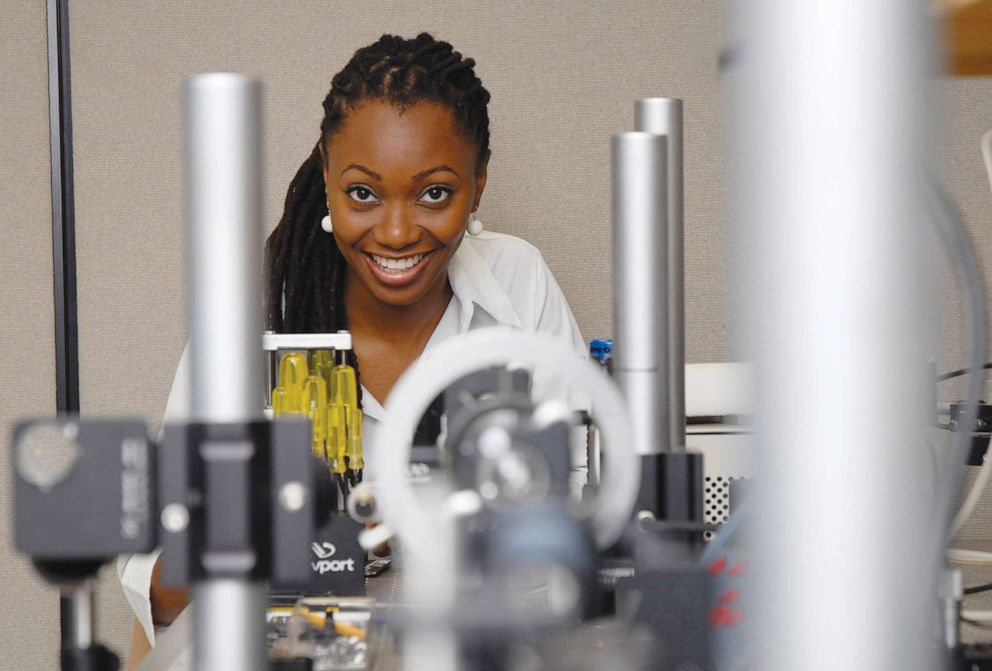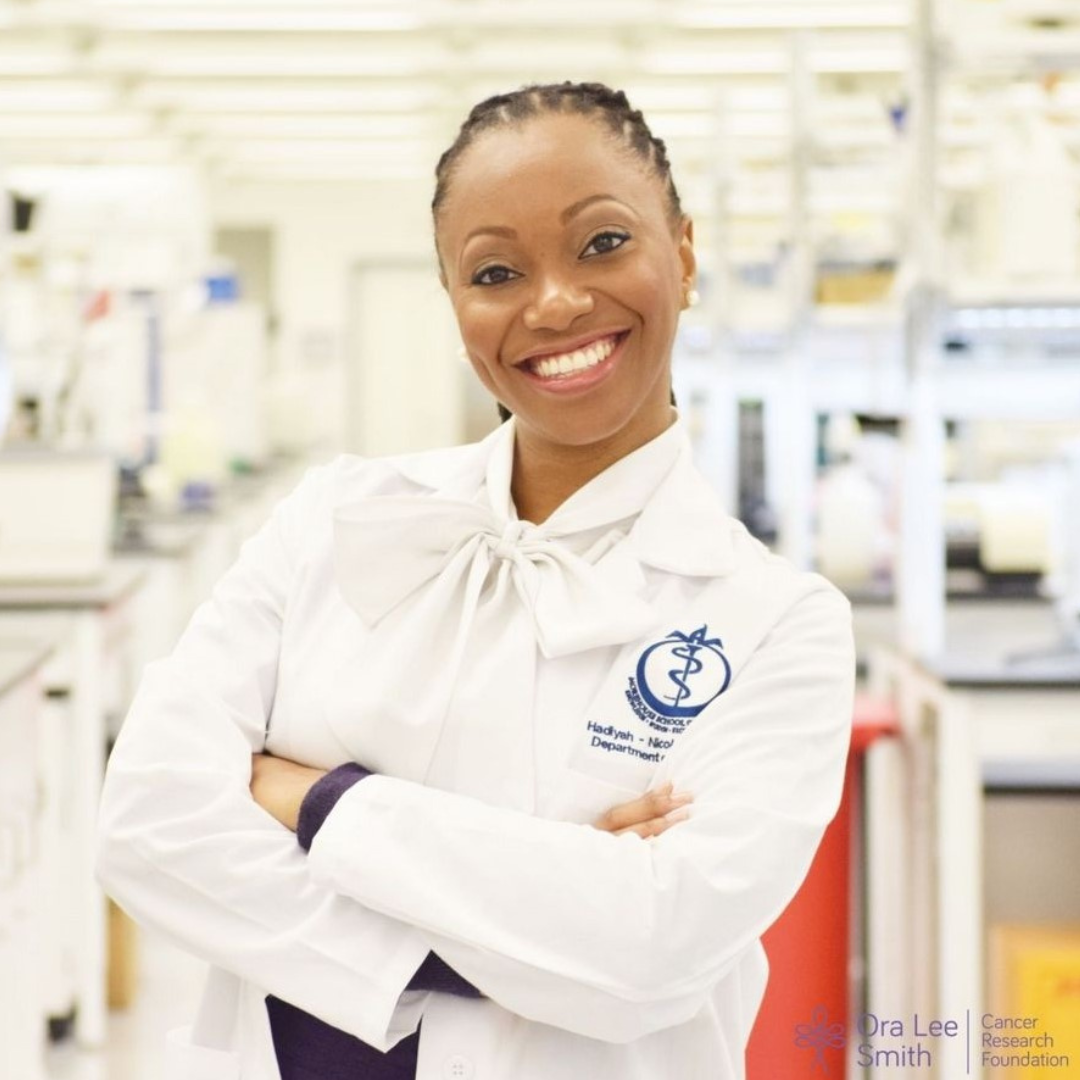Dr. Hadiyah-Nicole Green’s Cancer-curing Technology
 Dr. Hadiyah-Nicole Green did not set out to make history as the first doctor to cure cancer using nanoparticles. But on her journey, she did.
“When I was a little girl, I loved math and solving problems, but cancer was not on my radar until I was 22 and first from my family to graduate college,” Dr. Green said. “I never imagined that I would develop cancer-killing technology.”
History was made in 2014, when Dr. Green and her team published their studies, which showed that her laser-activated gold nanoparticle technology induced complete tumor regression (elimination) with clear tumor margins and healed skin in mice over 15 days after a single, 10-minute treatment, without observable side effects, chemotherapy, radiation, or surgery.
Fast forward to 2022 and Dr. Green is working hard to bring her treatment to the masses. She founded a 501(c)(3) nonprofit organization, the Ora Lee Smith Cancer Research Foundation, to raise the money to cover the human clinical trials and FDA approval expenses with the goal of remaining independent of investors so the treatment will be affordable for all.
Inspired by the $1 billion raised annually by cancer nonprofit charities, her strategy is to raise the $100 million needed to complete human trials and obtain FDA approval via donations and charitable gifts to her nonprofit. Her first fundraising milestone to begin human trials is $10 million, and she has already raised $2 million in crowd-funding and received another $2.3 million in federal funding from the Department of Veterans Affairs.
“I want to create more thrivers and more alivers who survive cancer,” she said.
In fact, her journey toward history-making status is intertwined with her personal cancer journey. A cancer experience that gave Dr. Green a nothing-can-stop-me attitude.
Dr. Hadiyah-Nicole Green did not set out to make history as the first doctor to cure cancer using nanoparticles. But on her journey, she did.
“When I was a little girl, I loved math and solving problems, but cancer was not on my radar until I was 22 and first from my family to graduate college,” Dr. Green said. “I never imagined that I would develop cancer-killing technology.”
History was made in 2014, when Dr. Green and her team published their studies, which showed that her laser-activated gold nanoparticle technology induced complete tumor regression (elimination) with clear tumor margins and healed skin in mice over 15 days after a single, 10-minute treatment, without observable side effects, chemotherapy, radiation, or surgery.
Fast forward to 2022 and Dr. Green is working hard to bring her treatment to the masses. She founded a 501(c)(3) nonprofit organization, the Ora Lee Smith Cancer Research Foundation, to raise the money to cover the human clinical trials and FDA approval expenses with the goal of remaining independent of investors so the treatment will be affordable for all.
Inspired by the $1 billion raised annually by cancer nonprofit charities, her strategy is to raise the $100 million needed to complete human trials and obtain FDA approval via donations and charitable gifts to her nonprofit. Her first fundraising milestone to begin human trials is $10 million, and she has already raised $2 million in crowd-funding and received another $2.3 million in federal funding from the Department of Veterans Affairs.
“I want to create more thrivers and more alivers who survive cancer,” she said.
In fact, her journey toward history-making status is intertwined with her personal cancer journey. A cancer experience that gave Dr. Green a nothing-can-stop-me attitude.
An Aunt’s History-making Influence
 Raised by her aunt, Ora Lee Smith, since age four, Dr. Green credits her aunt for encouraging her independent spirit. Ora Lee taught Dr. Green life’s basics, as well as instilled patience and determination in her at a young age.
“Even as an elementary-school kid, my aunt would tell me what to write on checks to pay bills, and she would have me help her write letters to her friends,” she said. “Also, when I was in kindergarten, my brother had me doing his fourth-grade homework, so I excelled academically. My childhood experiences prepared me for the academic challenges of solving a big problem like cancer.”
She has fond memories of what many would call a mundane, frustrating task. But Dr. Green saw a challenge that played a role in her success.
“My aunt used to have a bunch of necklaces that were entangled. To keep me busy, she’d sit me down so I could focus but I fell in love with the exercise of untangling necklaces. It was so much more than that, symbolically – it was an exercise in patience that helped me on my path.”
It was a path that made her the first in her family to graduate college. The celebration was bittersweet, however, as Ora Lee shared her cancer diagnosis shortly after, as well as her choice to forgo treatment. She dreaded the side effects of chemotherapy and radiation, and chose to live out the rest of her life on her own terms. Ora Lee lost her battle to cancer in 2003, three months after sharing her diagnosis with her family. Being part of her aunt’s cancer journey as her primary caregiver made Dr. Green mindful of the suffering cancer patients have to go through.
“I want to change how cancer is treated and reduce the suffering of cancer patients by providing a treatment that does not have harsh side effects.”
With her aunt’s influence motivating her, Dr. Green went on to become the second African American woman to earn a PhD in physics from the University of Alabama at Birmingham: the first big step toward curing cancer.
“Cancer picked a fight with the wrong family,” she said. “Even though we have lost family members to cancer that I could not save, I have developed a new arsenal in the war on cancer so we can all start winning.”
Raised by her aunt, Ora Lee Smith, since age four, Dr. Green credits her aunt for encouraging her independent spirit. Ora Lee taught Dr. Green life’s basics, as well as instilled patience and determination in her at a young age.
“Even as an elementary-school kid, my aunt would tell me what to write on checks to pay bills, and she would have me help her write letters to her friends,” she said. “Also, when I was in kindergarten, my brother had me doing his fourth-grade homework, so I excelled academically. My childhood experiences prepared me for the academic challenges of solving a big problem like cancer.”
She has fond memories of what many would call a mundane, frustrating task. But Dr. Green saw a challenge that played a role in her success.
“My aunt used to have a bunch of necklaces that were entangled. To keep me busy, she’d sit me down so I could focus but I fell in love with the exercise of untangling necklaces. It was so much more than that, symbolically – it was an exercise in patience that helped me on my path.”
It was a path that made her the first in her family to graduate college. The celebration was bittersweet, however, as Ora Lee shared her cancer diagnosis shortly after, as well as her choice to forgo treatment. She dreaded the side effects of chemotherapy and radiation, and chose to live out the rest of her life on her own terms. Ora Lee lost her battle to cancer in 2003, three months after sharing her diagnosis with her family. Being part of her aunt’s cancer journey as her primary caregiver made Dr. Green mindful of the suffering cancer patients have to go through.
“I want to change how cancer is treated and reduce the suffering of cancer patients by providing a treatment that does not have harsh side effects.”
With her aunt’s influence motivating her, Dr. Green went on to become the second African American woman to earn a PhD in physics from the University of Alabama at Birmingham: the first big step toward curing cancer.
“Cancer picked a fight with the wrong family,” she said. “Even though we have lost family members to cancer that I could not save, I have developed a new arsenal in the war on cancer so we can all start winning.”